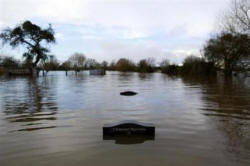|
 Europe's
flood losses to soar by 2050, research shows Europe's
flood losses to soar by 2050, research shows
 Send a link to a friend
Send a link to a friend
[March 03, 2014]
By Nina Chestney
LONDON (Reuters) - Extreme floods like
those swamping parts of Britain in recent months could become more
frequent in Europe by 2050, more than quadrupling financial losses, if
climate change worsens and more people live in vulnerable areas,
research showed on Sunday.
|
|
 The study said instances of very extreme floods, which now occur
about once every 50 years, could shorten to about every 30 years,
while cases of extreme damage now occurring once every 16 years
could shorten to once every 10 years. The study said instances of very extreme floods, which now occur
about once every 50 years, could shorten to about every 30 years,
while cases of extreme damage now occurring once every 16 years
could shorten to once every 10 years.
With shorter cycles of extreme floods and damage, the European's
current average losses of 4.9 billion euros a year could reach 23.5
billion euros by 2050, a rise of almost 380 percent, said the study
in the journal Nature Climate Change.
Scientists at several universities and research centers in Europe
and Australia used climate change models, economic data and river
discharge data to form their conclusions.
"Due to climate change and GDP growth, by 2050 a
one-in-fifty-years-flood might be one in 30 years so the frequency
of such losses increases dramatically - almost doubling," said
co-author Brenden Jongman, researcher at the IVM Institute for
Environmental Studies at VU University Amsterdam.

Extreme damage can more than double the average damage rate used in
the study's calculations. In June last year, extensive flooding
resulted in 12 billion euros ($16 billion) of losses in nine
countries across central and eastern Europe, according to
reinsurance company Munich Re.
RISING COSTS
The study said investment in flood protection measures could help
reduce the magnitude of overall flood losses in the future.
By investing around 1.75 billion euros in such measures, Europe's
annual flood losses could be reduced by around 7 billion euros, or
around 30 percent, by 2050, it estimated.
Rising costs from flood damage are due to several factors such as
changes in climate, land use, population and wealth. The European
Environment Agency said last year that costs from flooding were also
rising in part because more housing was being built in flood-prone
areas.
[to top of second column] |

Better reporting of floods has also contributed to the rising
overall cost of these inundations.
A U.N. panel of climate scientists has said the Earth is set for
more heat waves, floods, droughts and rising sea levels from melting
ice sheets that could swamp coasts as greenhouse gases built up in
the atmosphere.
Other bodies, such as the European Environment Agency, have said it
is likely that rising temperatures in Europe will change rainfall
patterns, leading to more frequent and heavy floods in many regions.
Britain is currently experiencing its wettest winter on record,
resulting in the worst floods for the country in 50 years.
Accountancy firm Deloitte said on Friday there were nearly 200,000
insurance claims in Britain in the last three months of 2013 due to
storms and floods - the highest number of such claims over a
fourth-quarter financial period for 10 years.
It has also estimated that the cost of repairing the damage caused
could reach 1 billion pounds ($1.66 billion). Insurance companies
such as Aviva and Swiss Re have urged for more action and investment
to manage flooding.
The paper is available at: http://dx.doi.org/10.1038/nclimate2124
($1 = 0.7317 euros) (Editing by Tom Heneghan)
[© 2014 Thomson Reuters. All rights
reserved.] Copyright 2014 Reuters. All rights reserved. This material may not be published,
broadcast, rewritten or redistributed.
 |